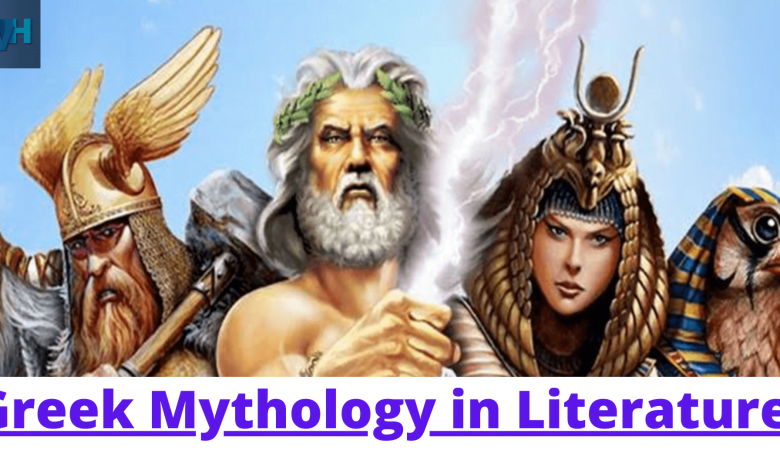
Greek Mythology in Literature is so popular that it has an immense influence on English and other European literature. It is a saying that
“If you are studying English literature without the knowledge of Greek Mythology, you are wasting your time”.
So, if you are interested in English literature and want to know about the influence of Greek Mythology in literature, then you are in the right spot.
We not only will tell you about the influence of Greek Mythology on English literature throughout history from the Renaissance to the contemporary age but also will explain the famous allusions of Greek Mythology in literature.
Now, without wasting your time, let’s get started.
What is Greek Mythology in Literature?

According to cultural historian Jacques Barzun,
“What links myth with literature is …. the imagination.”
Greek Mythology is the collection of ancient Greeks’ stories or myths about their gods, legends and heroes. These myths try to explain the nature and history of this universe.
Even though these stories were developed more than 2000 years ago, they still survive in the present age.
Just like Norse Religion or ancient Indian Mythology, Greek Religion narrates how this universe was created.
As we know that ancient Greeks worshipped many gods. So, these myths not only talk about the creation of different gods but also deals with the struggle of these gods for ultimate and supreme power.
Greek Mythology in Literature also recounts the consequence of gods’ deeds and adventures on the life of human beings.
In these Myths, gods’ activities and actions are associated with natural events like thunderstorms earthquakes, or the seasons and with religious ceremonies and rituals.
What are the nine realms in Norse mythology?(Yggdrasil Tree)
Influence of Greek Mythology in Literature:

Greek Mythology always try to teach their readers and believers different morals. These Myths also have the major contribution in the development of philosophy, psychology and literature.
Greek Mythology not only inspired the creation of English literature, but also has set down the solid literary base for the development of English literature. The evolution of English literature cannot be separated from Greek Mythology.
English literature is so deeply influenced by Greek Mythology that a new term “Hellenism” is coined.
Hellenism refers to love or devotion to ancient Greek Myths or style.
So, any literary work which is imitated or inspired by Greek Mythology in literature is dealt under the umbrella term of Hellenism.
The Dominant Gods of Greek Mythology
Reference to Greek Mythology in Literature throughout History:

Let’s discuss in detail the influence of Greek Mythology in Literature across different ages.;
Greek Mythology in Literature During Renaissance:
Representator of this Age: William Shakespeare

The Renaissance that began during 14th and 15th century in Italy and spread throughout the whole Europe was actually the rebirth (as the name suggests) of the ancient Greek Mythology in literature and art. This famous literary movement spread in England during the 16th century.
Many English writers, poets and playwrights of Renaissance started to write and compose their works by taking different materials from Greek Mythology. They also began to use several mythological allusions based on Greek Mythology in their writings.
Use of Greek Mythology in Literature by Shakespeare:

William Shakespeare is the one of many examples of playwrights from Renaissance age who were influenced by Greek Mythology in literature.
There is abundance of allusions from Greek Mythology in almost every play written by Shakespeare from Hamlet to Othello.
For Shakespeare the most important source of information about the ancient Greek Mythology was the famous Roman poet Ovid.
As the main source about myths was Roman, so, Shakespeare usually used Roman names of different Greek goods and deities.
For example, when Shakespeare referred to Zeus (Zeus is the king of all Greek gods and goddess), he called him Jupiter which is the Roman name for Zeus.
Troilus and Cressida (a famous tragedy written by Shakespeare) is also an important example in this regard. This tragedy is not completely based on Greek Mythology, but is actually drawn from it.
Why Cronus and Rhea Myth is so popular in Greek Mythology?
Greek Mythology in Literature During Puritan Age:
Representator of this Age: John Milton

The Puritan Age started from the beginning of 17th century and lasted up to 1660. Although the main concern of this age was religious and political idealism, but the Greek Mythology continued to inspired the writers of this age.
Use of Greek Mythology in Literature by John Milton:

John Milton (who is the sole represented of puritan age) was well familiar with the myths, culture and history of ancient Greece.
In his poem Comus, Milton deals with almost thirty figures and tales from ancient Greek Mythology in Literature.
Milton’s most famous poem Paradise Lost” was written on the same structure as of Iliad and Odyssey of Homer.
In Paradise Lost, Milton used many classical allusions from invocation to a muse to mentioning Scylla and Hercules from Greek Mythology.
Greek Mythology in Literature During Romantic Age:
Representator of this Age: John Keats

The start of 18th was the time of philosophical revolution. It was the time when Enlightenment spread throughout Europe. Just like other arts, the Enlightenment movement also affected literature.
Though the major theme of this age was the celebration of reason but somehow this leads towards certain reaction against the use of Greek Mythology in literature.
But by the end of 18th century the Romantic movement which was inspired and initiated by French revolution, brought back the Greek Mythology in literature.
It was the significant time in England, for the new translations of Greek Mythology in literature like Homer’s tragedies. These translations in turn motivated the contemporary poets of that age, such as Shelly and Keats.
Use of Greek Mythology in Literature by John Keats:

John Keats or “the poet of beauty” was known for his love and interest in Greek Mythology. In fact, it was the Greek Mythology which helped Keats to universalize his poems.
Keats used a lot of allusions from Greek Mythology in literature to demonstrate the importance and value of love.
Keats was a dreamer and a man of imagination. He was sick off the reality of this world. Greek Mythology provided him an escape from harsh reality.
Although the romantic spirit of Keats in his other poems was never fade, but the poems in which he used Greek Mythology are absolutely flawless. The Greek Spirit in Keats helped him to achieve the perfection of form.
Greek Mythology in Literature During Contemporary Age:
Representator of this Age: J. K. Rowling

During the modern age, when everything is dealt with scientism and technology, spirituality has been lost. But many modernist writers comprehend it and asserted the significance of the use of Greek Mythology in literature.
From TS Eliot’s “The Waste Land” to James Joyce’s “Ulysses” and J. K. Rowling’s Harry Potter” all are in favour of the employment of Greek Mythology in order to give shape to the contemporary fragmented reality.
Use of Greek Mythology in Literature by J. K. Rowling:

Greek Mythology has inspired J. K. Rowling on the shaping of the plot in all the seven Harry Potter novels. It has influenced the writer to create various human and non-human characters in these books.
The Greek mythological allusions in Harry Potter novels are more than a tool for effective writing, it actually played a major role in the development of the storyline and also played an important role in the books becoming so popular worldwide.
Allusions to Greek Mythology in Literature:
Allusion is a literary technique used by a writer, poet or playwright. Mythological allusions are casual references to a famous mythological events or figures.
There are a lot allusions from Greek Mythology in literature. Some famous ones are given below.
Achilles’ heel:

According to Greek Mythology, when the famous legend Achilles as a baby, was dipped into the mysterious River Styx, he became invulnerable to any harm.
Only his heel lest vulnerable and unprotected as he was held by it while being dipped into the water. This heel ultimately became the cause of his downfall, when it was struck by an arrow.
In literature, Achilles’ heel refers to a person’s fatal weakness or vulnerable area.
Argus-eyed:
In Greek Mythology, the giant Argus had one hundred eyes. The queen of all Greek gods and goddess Hera hired him to spy on her husband and king of all gods Zeus.
While dealing with Greek Mythology in literature, Argus-eyed refers to carefully observant or jealous watchfulness.
The Most Famous Roman Mythology Creatures from Antiquity
Cupid:

Cupid is the Roman name of Greek love god Eros. The depiction of Cupid is as a winged boy, who is carrying a bow and arrow.
In literature, it is said that when someone suddenly falls in love, he has been struck by Cupid’s arrow.
Circe Goddess in Homer’s Odyssey (The Legendary Witch)
Pandora’s Box:

When Prometheus stole divine fire and gave it to humans, Zeus created Pandora in revenge of it. She was the first woman on this planet.
Zeus also gave a box and instructed her not to open it. But because of her curious nature, she opened the box and all the forms of evils escaped from it and plagued the world.
In literature, Pandora’s Box refers to any small incident or thing which upon investigation, leads to extreme and unwanted trouble.
What is the Pandora’s Box? (A Guide to Greek Myth of Pandora)
Conclusion:
All in all, the impact of Greek Mythology in literature has a long history and heritage. The Greek Mythology is not only the cradle of English literature, but also plays a significant role in the evolution and development of English literature over time.
This can be seen in the works of all the classical poets and playwrights and also in different allusions used in the English language and literature.



